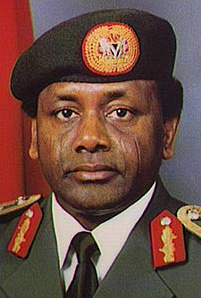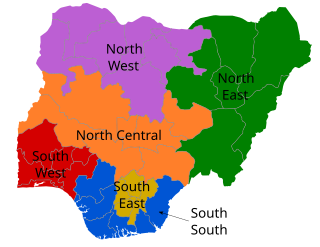Related Research Articles

Sani Abacha was a Nigerian military officer and politician who ruled as the military head of state after seizing power in 1993 until his death in 1998. Abacha's seizure of power was the last successful coup d'état in the Nigerian military history.

The Nigerian Air Force (NAF) is the air branch of the Nigerian Armed Forces. It is the youngest branch of the Nigerian Armed Forces. It is one of the largest in Africa,consisting of about 18,000 personnel as at 2021and aircraft including 9 Chengdu F-7s,12 Dassault-Dornier Alpha Jets,three JF-17 Thunder Block II and 12 Embraer EMB 314 Super Tucano aircraft,24 M-346 FAs on order,Helicopter gunships,armed attack drones,and military transport aircraft.
Abubakar Dangiwa Umar was governor of Kaduna state in Nigeria from August 1985 to June 1988 during the military regime of General Ibrahim Babangida. After retiring from the army in 1993,he became a social critic and the founder of Movement for Unity and Progress,a political party.
Abdullahi Sarki Mukhtar was formerly the National security adviser to the president of Nigeria. Rtd Major General Mukhtar was also a former military governor of Kaduna state and Katsina State,in the case of the latter he was the first administrator or governor.
Paul DikeMSS DSS fwc is a retired air chief marshal of the Nigerian Air Force,who was the Chief of the Air Staff from 2006 to 2008. In August 2008,he was appointed Chief of the Defence Staff. Prior to his appointment as Chief of the Air Staff,Dike was Air Officer Commanding Tactical Air Command. Appointed Commander of the Presidential Air Fleet in 1997 by military dictator General Sani Abacha,he was appointed Chief of Air Staff by General Olusegun Obasanjo's civilian government in 2006.
This article is about the particular significance of the year 1993 to Nigeria and its people.
The 1966 Nigerian counter-coup,or the so-called "July Rematch",was the second of many military coups in Nigeria. It was masterminded by Lt. Colonel Murtala Muhammed and many northern military officers. The coup began as a mutiny at roughly midnight on 28 July 1966 and was a reaction to the killings of Northern politicians and Officers by some soldiers on 15 January 1966. The July mutiny/counter coup resulted in the murder of Nigeria's first military Head of State General Johnson Aguiyi-Ironsi and Lt Colonel Adekunle Fajuyi in Ibadan by disgruntled northern non-commissioned officers (NCOs). Upon the termination of Ironsi's government,Lt. Colonel Yakubu Gowon was appointed Head of State by the July 1966 coup conspirators.
Sani Bello is a Nigerian statesman and military administrator who served as Governor of Kano State from 1975 to 1978. After his retirement,he amassed an enormous fortune through investments in oil,telecommunications and electricity;going on to establish the Sani Bello Foundation.
Ibrahim Taiwo was a Military Governor of Kwara State from July 1975 to February 1976 during the military regime of General Murtala Mohammed. He assisted in establishment of the University of Ilorin,which was founded by decree August,1975.
Dominic Obukadata Oneya was Administrator of Kano State,Nigeria from August 1996 to August 1998 during the military regime of General Sani Abacha,then Administrator of Benue State from August 1998 to May 1999 during the transitional regime of General Abdulsalami Abubakar,handing over power to the elected executive governor George Akume on 29 May 1999. Later,he became Chairman of the Nigeria Football Association.
Bashir Salihi Magashi is a retired Nigerian army major general and current Defence Minister of Nigeria. He was appointed Governor of Sokoto State from August 1990 to January 1992 during the military regime of General Ibrahim Babangida. He was appointed Nigeria's Minister of Defence by President Muhammadu Buhari on 21 August 2019.
Colonel Umar Farouk Ahmed was Military Administrator of Cross River State,Nigeria during the military regime of General Sani Abacha. He was then appointed administrator of Kaduna State in August 1998 during the transitional regime of General Abdulsalami Abubakar,handing over power to the elected civilian governor Ahmed Mohammed Makarfi in May 1999. Shortly after,he was retired by the Federal Government,along with all other former military ministers,governors and administrators.
Lawan Gwadabepronunciation is a Nigerian military officer,he was Military Administrator of Niger State in Nigeria from December 1987 to January 1992 during the military regime of General Ibrahim Babangida. Gwadabe was one of the few men in the army enjoyed the best of life,training and privilege,known for his peculiar swagger,and handsomeness.He was accused of planning a coup against General Sani Abacha in 1995,for which he was jailed,tortured and convicted of treason. After Abacha's death he was granted a state pardon.
Suleiman Saidu is a retired Nigerian Navy Rear Admiral who served as Chief of Naval Staff from September to November 1993.

Very Rev. Fr. Moses Orshio Adasu became governor of Benue State,Nigeria on 2 January 1992,elected on the Social Democratic Party (SDP) platform. He left office after the military coup in November 1993 in which General Sani Abacha came to power.
Lawrence Anebi Onojalisten was the military governor of Plateau State,Nigeria from 1986 to July 1988 and then of Katsina State until December 1989 during the military regime of General Ibrahim Babangida. He later became Principal Staff Officer to General Sani Abacha,before being arrested for alleged involvement in a coup attempt. He retired from the army in 1998,and after the return to democracy in May 1999 with the Nigerian Fourth Republic entered into politics.
Colonel (retired) Peter A.M. Ogar was Military Administrator of Kwara State,Nigeria between August 1996 and August 1998 during the military regime of General Sani Abacha. After the return to democracy in 1999,Ogar was required to retire,as were all other former military administrators. When the United Nigeria Development Forum was formed by former military governors in April 2001,Ogar was a member of the steering committee.

Hamza Al-Mustapha is a former Nigerian Army major and intelligence officer who served as Chief Security Officer to General Sani Abacha,who was Nigeria's military head of state from 1993 until his sudden death on 8 June 1998.

The Federal Republic of Nigeria is divided into six geopolitical zones,commonly just called zones. They are a type of administrative division grouping the country's states,created during the regime of president General Sani Abacha. Nigerian economic,political,and educational resources are often shared across the zones.
Ishaya Rizi Bamaiyi,is a retired Nigerian Army lieutenant general who served as Chief of Army Staff from 1996 to 1999 during the military regime of Generals Sani Abacha and Abdulsalami Abubakar. His older brother was Major General Musa Bamaiyi,former Head of the National Drug Law Enforcement Agency (NDLEA).
References
- 1 2 "Nigerian States". WorldStatesmen. Retrieved 2010-01-03.
- ↑ Quadri, Opeyemi (2019-02-04). "History Of Benue State: Past Governors From 1976 Till Date And Natural Resources". Actionable Info. Retrieved 2023-06-06.
- 1 2 "Group Capt. Joshua Obademi". Government of Benue State. Archived from the original on 2011-07-11. Retrieved 2010-01-03.
- ↑ "Nigerian Military Authorities Pledge to Curb Religious Violence". Compass Direct. Aug 22, 1996. Retrieved 2010-01-03.[ permanent dead link ]
- ↑ "Promoting Health Through Women's Functional Literacy and Intersectoral Activity" (PDF). World Health Organization. 24 November 1994. Retrieved 2010-01-03.